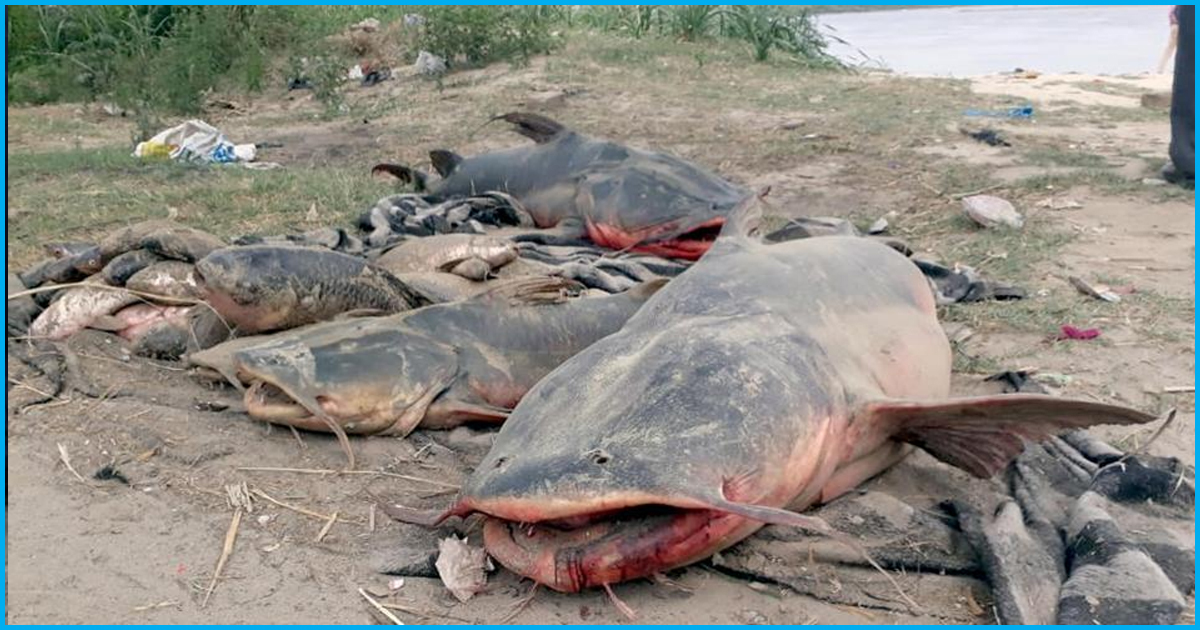
Punjab: Molasses Leak From A Sugar Mill Kills Hundreds Of Fish & Turns River Beas Dark Brown
20 May 2018 4:38 AM GMT
Editor : Ankit Sharma Sharma
Green tea Addict | A Tree Hugger | Born for Change
A large number of fishes and aquatic animals were found dead on the cost of River Beas, Punjab on Thursday, reportedly due to release of molasses – a chemical fluid from a sugar mill along the shore into the river resulting in water contamination.
The presence of molasses a byproduct from sugar factories came from ‘Chadha Sugar Industries Private Limited’ located at Kiri Afgana village in Gurdaspur district which is reported to have affected over 30km of the river stretch. Molasses or black treacle is a viscous product resulting from refining sugarcane into sugar. The administration, however, denied the leakage of the fluid and claimed it was an accidental release.
Locals in Amritsar reported an unusual incident of Beas River turning dark brown to the officials. Hundreds of dead fish were found floating along the banks of the river as reported by the Local Panthak Media
Officials, including Deputy Commissioner of Amritsar Kamaldeep Singh Sangha, and experts from the Punjab Pollution Control Board and wildlife department visited the site to examine the situation. The Punjab PCB has ordered for immediate closure of the factory.
“The leakage eventually led to the increase of biological oxygen demand (BOD) in the water, resulting in fall of oxygen content. This caused the death of fish and other water animals” said DC Sangha to ANI
Freshwater is released from Pong and Ranjit Sagar Dams to help contain the problem. “Water sample reports are better after the release of water from the dams,” said DC Sangha
Punjab environment minister OP Soni, along with Amritsar MP Gurjit Aujla, visited the affected area and looked into the issue. “I have marked an inquiry into the incident. The water samples were being collected from various places in the river and sent to concerned departments to check the impact of the disaster” said OP Soni to The Times of India.
The Minister also reiterated that “They didn’t find any toxin in the river water. “Lack of oxygen in the water has been determined as the cause of death of the fish,”
Amritsar MP Gurjit Aujla condemned the accident and warned that “disturbing the ecological balance is a serious offence which attracts strict action,”
People along the shore were spotted taking away the dead fish. Deputy commissioners of the affected districts issued a warning to people to not eat or sell dead fish and stop using river water for own consumption or giving river water to cattle for drinking till is cleaned.
The release of any chemical fluid into river water is a violation of the Water Act, 1974, and the presence of toxic chemical substances puts animal life at high risk. “The death of fishes in Beas River is a big disaster and chief minister Capt. Amarinder Singh should intervene in the matter to ensure strict action against the guilty” said noted environmental activist Balbir Singh Seechewal
The number of polluted rivers in India has increased twofold from 121 to 275, in an assessment by the central pollution control board (CPCB) of India in the year 2015. “A primary cause is the quantity of sewage generated by cities and towns along polluted stretches,” reported The Guardian.
A study on Beas River is published in the journal Advancing Earth and Space Sciences. Its findings reveal that the high deposits of metals are found in the Beas River basin polluting the Kanjli wetland. They were exceeding the limits prescribed by the Bureau of Indian Standards. It was found due to direct discharges of industrial and domestic sewage at upstream points indicate the pollution of Kanjli wetland, which is a part of the Beas River basin.
With Government spending excess money on “Clean Ganga Project” which is in stagnation, it should invest more in productive plans to prevent causes of pollution firsthand. The CPCB report also states that “given population increase, demand for freshwater for all uses will be unmanageable” with a vast crisis ahead India is facing severe water problems and the government should intervene to resolve and take prompt actions.
Also published on Medium.
 All section
All section













